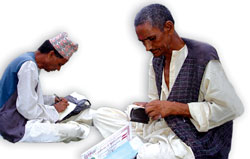|
|
NEPALGANJ - At an NC political leadership workshop two conspicuous old men sit squeezed into a corner. They look terribly frail. One intuitively feels there's more to them than meets the eye.
Slowly, their story unfolds. Prem Bahadur Hamal, 65, and Laxmi Prasad Acharya, 64, are both from Sinja village in Jumla. Once seasoned, influential Nepali Congress leaders, they were abducted, beaten and had their property confiscated seven years ago when they refused to join the Maoists. Since then, they have lived in Nepalganj's camps for the displaced.
Prem Bahadur joined the NC in the late 1950s, and remembers being jailed for reading Tarun. He rose to be the NC district president, and has been jailed several times for his democracy activism, including during the recent Jana Andolan.
Of his 1998 brush with the Maoists, he says, "2,000 Maoists surrounded my house and nearly beat me to death." He was shot twice, and his life savings of Rs 97,000 was taken. Today, he's in a camp in Jumle Tole with his family of 11.
Laxmi Prasad joined the NC about a year after Prem Bahadur, inspired by BP Koirala. "People have minted money misusing BP's name but hardly any stand by his ideology," he says. He left home after the Maoists threatened to kill him if he didn\'t join them. With 13 family members, he ekes out just enough to live.
Both men remain devoted to the party that symbolises their fight for a democratic Nepal. "I was invited to a program to learn about democracy and leadership from youngsters who weren't even born when I joined," says Laxmi Prasad wryly.
Neither man is looking outward for support. Laxmi Prasad believes human rights organisations only favour leftist party workers, and Prem Bahadur asks what the government can do "when there are thousands like me wounded or dying in Kathmandu hospitals."
Still, they seem surprisingly optimistic and determined. They won't endorse the Maoists, though it would mean a safe return home. Their wishes for the future are simple. Prem Bahadur says his only goal is to pay off his debts before he dies, and Laxmi Prasad wants to go home to the village he spent sixty years in and pray at the local temple.
The men refuse an offer of help with the bus fare back to the camps. Laxmi Prasad says, "All we Nepalis have is our dignity."
Shrishti RL Rana



